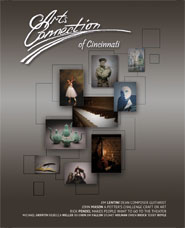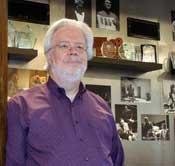“…I feel my role as a critic here in Cincinnati is to write about theater in a way that makes people want to go to the theater. I try to extrapolate an important fact or meaning from the show, write something interesting and give a frame of reference why this is an important work beyond just offering a description of what is on stage.”
“…I try to be objective – to step back, look at the picture and convey it in a way that is meaningful to people. I divorce myself from any personal relationship I might have with actors involved in the show, and observe: are they effective in the work they are doing? Are they conveying a character interestingly, realistically, whatever is appropriate to the work? I don’t write reviews for people who are working in the theater. If they want to read it and learn something from it then more power to them. I’m writing for the readers.”
“…I don’t like to write reviews that are pans. It can be fun occasionally, but it’s not something I gravitate to do. I am more of the glass is half full rather than half empty. If there is something dramatically wrong then I think it needs to be said, but in large I work under the philosophy that intention of most people when they work on a theatrical production is to do a good job.”
“…Evaluating plays, I hold things up against the bodies of work that I’ve seen over 40 years of theatre going. They sometimes entertain me, sometimes challenge me, sometimes offend me, and I still may come away liking them. I look for things that are well done.”
“…Most of the artistic directors at Cincinnati theaters have got their fingers on the pulse of what their audience wants to see. They offer enough and the quality has not been so much an issue in my experience, it’s more if people like the subject matter or not. The Playhouse as an example, some of the work is a little more experimental, some of it is a little more mainstream. The more mainstream plays pay the bills, the more experimental plays satisfy everyone who wants things to push the envelope a little bit more, and it works for everybody. People subscribe because they know whatever gets on stage they will like the quality. I have rarely seen a production when the artistic directors did a poor job of staging.”
“…I wish the support of the arts was not as politicized as it is. Conservative politicians tend to act as if art is subversive. I think art is something that furthers us a society. Good theatre makes us think about issues more broadly and importantly. It helps us to confront problems in a society that we may not personally be involved in but we grow and learn from.”
Please read full article in Winter issue


